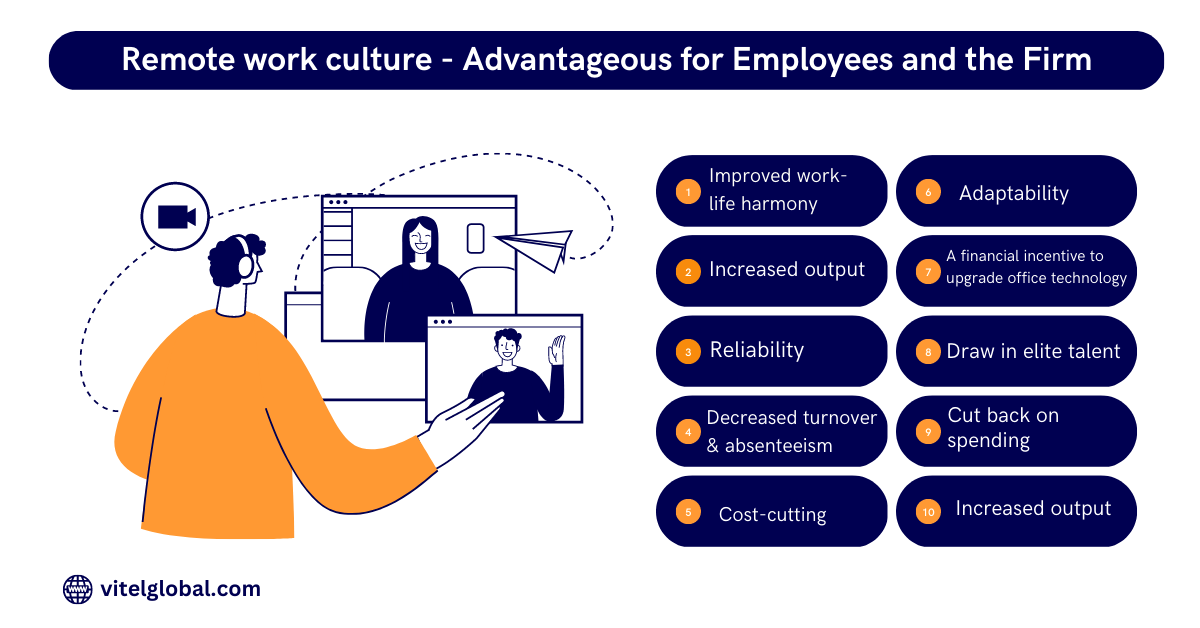Remote Work Culture – Advantageous for Employees and the Firm

5 min read
What is Remote Work Culture?
Working from the office desk, sitting at home, and working is called remote Working. Many businesses related to different fields didn’t have the option of working from home. But after the evolution of the COVID era, almost all the fields were encouraged to work from home, thus increasing the importance of this term. There are benefits and drawbacks to working remotely.
Here are some considerations for businesses as the world transitions from lockdowns to a new working environment.
Remote Work Culture Advantages
Some businesses soon established a work-from-home routine, but others needed time to build the necessary systems to make remote work possible. After ironing out the bugs, organizations discovered that this new working method had certain advantages.
Improved work-life harmony
Nowadays, people wonder how difficult it is to maintain a proper work-life balance. When eight hours or more of work each day are considered, including commuting time and sleep. As a result, there is little time left for family, so long commutes are eliminated when working from home, allowing for more time with loved ones.
Employees are free to wear anything they choose, free of dress code, on days when they are not needed to participate in video meetings. Fewer stress results from a higher sense of comfort and improved work-life balance.
Increased output
According to a few surveys or research done during and after the COVID era, remote workers reported consistent or higher productivity when working from home instead of in an office. Check with the productivity results retrieved during and after pandemic peak times. There is evidence proving the highest productivity of the businesses observed. Also, this evidence proves that flexibility brings increased output. Have a look at Remote Working tips to increase productivity.
Reliability
Many of the factors that contribute to tardiness no more exist if you work from home. Those features include oversleeping, traffic issues, and waiting in a big queue at the drive-through for your morning coffee. But after the introduction of remote working culture, these problems disappeared, thus saving a lot of time to get out of bed and get to work.
Decreased turnover and absenteeism
Businesses may retain staff and reduce absences by allowing remote work. In addition, they are more likely to feel positive about the company’s leadership. Thus, they don’t feel micromanaged and think their boss trusts them. As a result, employees will be less likely to be enticed to hunt for employment elsewhere, encouraging a sense of loyalty and dedication. Even if employees are not actively seeking other employment, they may be less likely to cancel work abruptly.
Cost-cutting
Businesses can rent small office spaces or even totally relocate to a remote location. As a result, businesses spend less on rent, utilities, and other office supplies.

Adaptability
Employees who work remotely can do so from any location. It might not be just their homes, they can work from coffee shops, beaches, and other nations.
Organizations will be able to run operations beyond the normal workday timings if asynchronous work is appropriate. Flexible work hours can be a blessing for workers who are night owls or have young children.
A financial incentive to upgrade office technology
When the pandemic started, businesses rushed to have the appropriate capabilities to support remote work. Also, many businesses were employing out-of-date equipment, which made them improve their systems. Some businesses found it challenging to scale from a small number of workers with remote work capabilities to the full workforce.
To replace outdated systems and manual office procedures, organizations needed business messengers, video conferencing platforms, time-tracking software, and task management tools. Remember that you can easily integrate cloud services with existing systems.
Draw in elite talent
Remote Working will substantially expand your talent pool, and companies that fail to accommodate a remote workforce risk losing their finest employees and turning away tomorrow’s top talent. You may now discover specialist personnel anywhere and no longer constrained to a certain region.
As a result, you are better equipped to draw in top talent. This is how you can identify the right fit rather than just settling for the best candidate. Companies in highly competitive regions, cannot find enough individuals to fill specific posts and would value this benefit.
However, you can broaden diversity at your business if you hire from a bigger pool and gain from the many viewpoints and ideas people bring. With this benefit, you can hire people from all over the world or just from different parts of a country.
Decrease employee churn
Offering remote work is an effective retention strategy for businesses. This resulted from much research that found that organizations that provide remote work experience with a 25% reduced turnover rate. So, firms have to consider the costs that might go twice as much to replace a highly skilled employee’s salary annually.
But, with digitization, the value of the service becomes clearer as the ability to work remotely relieves many burdens. Because, employees often churn with issues like commutes, health issues, and life events, frequently leading to employees quitting their professions.
Cut back on spending
If a company allowed employees to work remotely, each employee would save huge budgets when calculated annually. In addition, firms require less real estate because of remote workers. Meaning, you’ll spend far less money renting or purchasing office space. An office’s operating expenses, such as those for computers, phones, energy, heating, and air conditioning, are less when a workforce works remotely.
Increased output
According to a popular survey, employees who spend 60 to 80 percent of their time away from the workplace are the most engaged. From this, the company equips improved productivity. This is calculated with various variables as opposed to frequently arriving late or departing early.
According to the study, remote working is less distracting and makes it much easier for employees to focus. Because employees at home are free to work when they are most productive. It means early in the morning or late at night, and they frequently put in more hours each week.
Why isn’t everyone using a remote workforce if so many benefits exist? Yet! The potential difficulties are as substantial as the advantages. Companies with employees spread out over the world may have challenges. Different people from different parts sometimes can’t cope with culture, employee performance, and communication. There are, however, methods that help reduce the difficulties and enhance the advantages of remote labor.
The Difficulties of Remote Working
- This can result in longer workdays.
- Conflicts between personal and professional life.
- The intensity of work.
- Isolation.
- Pressure on teams.
The Final Word
The advantages appear to be obvious to both businesses and employees, but it’s crucial to initially consider a few crucial points if you’re thinking about the effects of remote Working for your workforce.
On the other hand, we must also consider the challenges of the remote working culture. Have a look at the common problems remote working employees commonly face.
Book a Free Live Demo now to learn how our Business Phone Solutions help in Remote Work Culture.
Work from Anywhere, Thrive Anywhere
Benefits of remote work culture and how it can boost employee satisfaction, productivity, and work-life balance.
Published: January 24th, 2023
Subscribe to Our Latest Updates
Get monthly product and feature updates, the latest industry news, and more!








